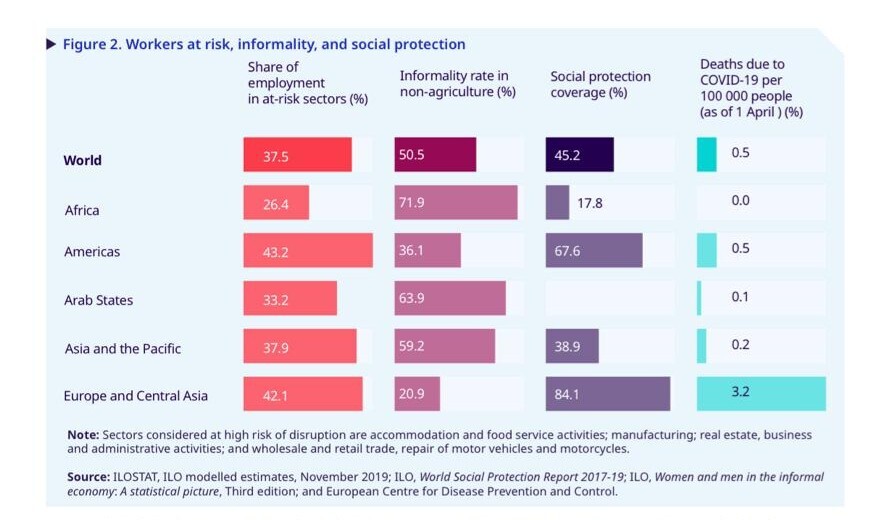April 22, 2020
As the COVID-19 pandemic continues to expand around the world, Latin America is expected to become one of the hardest-hit regions. One of the biggest obstacles countries face in responding to the pandemic is that, according to the International Labor Organization (ILO), about 40 percent of all employment in the Americas in 2019 was informal. Many of these workers depend on day-to-day activities just to survive, and complying with stay-at-home orders is often a life-or-death decision. This indicates a worrying outlook for street vendors, domestic workers, and even small business owners. The ILO notes that there has been growth in the informal sector in the last few years, rendering the region even more susceptible to large economic damage from the COVID-19 pandemic. The International Monetary Fund is forecasting a 5.2 percentage point fall in the region’s GDP in 2020 as a result of the ongoing crisis.
Government responses must be universal
While most governments in the region have enforced some level of stay-at-home order, these policies highlight the fragile nature of many lives in Latin America and how they will be strained further due to the novel coronavirus pandemic. The prevalence of informal employment points to the need for governments to enact universal policies that ensure access to assistance and health care for all those affected.
Those in the informal economy are at particular risk during the pandemic. As can be seen in the figure below, the ILO notes that the Americas has the highest percentage of workers employed in “at-risk” sectors, while more than 30 percent of Latin Americans are not covered by governments’ social protection measures.

Because of the high rate of unregistered businesses and informal workers, only a small percentage of aid aimed at formal sectors is likely to reach these employers, their workers, and their employees’ families. In responding to the pandemic, governments must design policy responses with informality at the forefront. Food distributions, cash payouts, and access to public services must be accessible to all — even those not formally employed. Some governments have acknowledged this reality. The Colombian and Brazilian governments have both proposed $40 monthly payouts, though this is unlikely to adequately support informal workers throughout the crisis. Venezuelan migrants in Colombia are undoubtedly among the hardest hit during this outbreak. 60% of the nearly 1.8 millions Venezuelans in Colombia don’t have regular status. This suggests that a staggering number of Venezuelan migrants work in the informal sector and will need to be taken into consideration when drafting more inclusive policies.
An increase in inequality calls for formalizing more workers
Unfortunately, with an expected deep economic downturn, Latin America risks seeing a steep increase in inequality. According to a report published by Oxfam, there are currently 162 million people living on $5.50 a day in Latin America and the Caribbean, and even a 5 percent contraction in income means 2.6 million people will fall under the poverty line. In its report Oxfam predicts in the most extreme case of a 20 percent contraction, there could be an increase in the number of those in poverty ranging from 13.1 million to 54.3 million. Although some of these people might work in the formal economy (e.g., for factories), the reality is that the crisis could push many more into the informal economy, exacerbating inequality in the region.
Projected Effects of Drops in Income to the Poor in Latin America and the Carribean
(the term ¨hit¨ designates a contraction in income)
|
Number of Poor (million) |
Additional Poor (million) |
||||||
|---|---|---|---|---|---|---|---|
|
Aggregated |
Status quo |
5% hit |
10% hit |
20% hit |
5% hit |
10% hit |
20% hit |
|
Under $1.90 a Day |
25.3 |
27.9 |
30.8 |
38.5 |
2.6 |
5.5 |
13.1 |
|
Under $3.20 a Day |
66.4 |
72.8 |
80.2 |
98.6 |
6.4 |
13.8 |
32.1 |
|
Under $5.50 a Day |
162.0 |
174.6 |
187.8 |
216.3 |
12.5 |
25.8 |
54.3 |
|
Source: Oxfam |
|||||||
ILO Director-General Guy Ryder stated that after this crisis unfolds, new systems must be “safer, fairer and more sustainable.” This must include a plan to make formal economies more inclusive and social protections more extensive. Informal labor markets show the unfortunate reality of many in Latin America, and the current crisis should be an opportunity for government officials to recognize the importance of formalizing these workers in the economy. Decision-makers must however, do so in a way that will not expand pre-existing inequalities but rather offer a platform to reduce the economic gap in the region.






